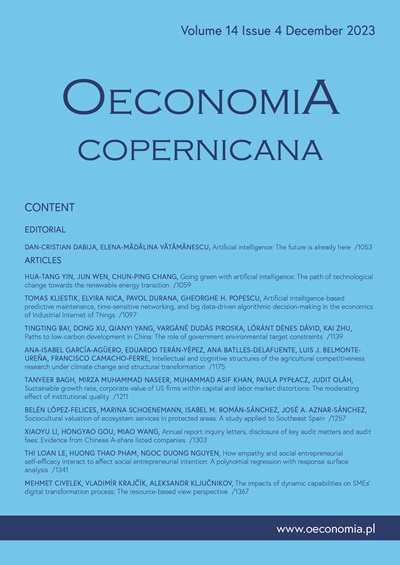是什么推动了人们对清洁能源的偏好?参数化温室气体环境质量需求的弹性
IF 10.8
1区 经济学
Q1 ECONOMICS
引用次数: 2
摘要
研究背景:影响环境质量需求的因素的异质性意味着一系列旨在实现清洁生产的政策和行动,以应对污染和对自然环境的破坏所带来的挑战。尽管这个话题已经被广泛讨论,主要是从环境库兹涅茨曲线假说(EKC)的传统角度来看,但人们认为环境是一种奢侈品,其收入弹性大于统一性。然而,最近人们认识到,收入和清洁能源需求之间的关系可能更加复杂,可能需要进一步调查才能更好地理解。文章目的:这项研究工作采用了一个欧洲国家小组,为温室气体(GHG)的收入环境质量需求弹性及其与其他重要因素的关系提供了直接明确的参数。它为收入和清洁能源偏好之间的复杂关系提供了定量的新见解。方法:采用层次回归方程方法分析收入-环境质量需求弹性的演变,包括与EKC偏好方相关的其他协变量,如消费、R+D投资和BERD(企业研究与发展)。这项实证研究的数据来自一个由16个欧洲国家组成的小组,涵盖了2010年至2020年期间的数据。研究结果和附加值:研究结果有力地证明,环境质量需求的弹性虽然是积极和显著的,但并不超过1。为了获得高于统一的弹性,还需要两个变量,即商业企业的研发支出和公民暴露在空气污染中的程度。这两个因素对代理商对清洁能源的偏好有着相似甚至更高的影响,这也意味着公民的偏好是技术发展的内生因素。在理论层面上,这项工作表明,技术和偏好的论点并不能替代EKC的解释,但技术发展对居民的偏好产生了积极影响,他们对环境质量的需求在很大程度上取决于他们看到污染的能力,甚至超过了他们的收入水平。这也意味着,旨在提高环境意识的公共政策应首先针对公民受污染程度较低的地区。本文章由计算机程序翻译,如有差异,请以英文原文为准。
What drives the preferences for cleaner energy? Parametrizing the elasticities of environ-mental quality demand for greenhouse gases
Research background: The heterogeneity in the factors that affect demand for environmental quality implicates a diverse set of policies and actions aimed at achieving cleaner production to address the challenges posed by pollution and damage to the natural environment. Even though this topic has been widely addressed, mainly from the traditional perspective of the Environmental Kuznets Curves hypothesis (EKC), it has been assumed that the environment is a luxury good with an income elasticity greater than unity. However, it has recently been recognized that the relationship between income and demand for cleaner energy may be more complex and that further inquiry may be needed for a better understanding.
Purpose of the article: This research work, employing a panel of European countries, offers direct explicit parameters for the elasticity of income-environmental quality demand for Greenhouse Gases (GHG), as well as its relationship with other important factors. It provides quantitative novel insights into the complex relationship between income and the preferences for cleaner energy.
Methods: A hierarchical regression equations approach is used to analyze the evolution of the elasticity of income-environmental quality demand with the inclusion of further co-variates that are relevant for the preferences side of the EKC, such as consumption, R+D investment and BERD (Business Enterprise Research and Development). The data for the empirical study comes from a panel of 16 European countries for the period from 2010 to 2020.
Findings & value added: The results show robust evidence that the elasticity of environmental quality demand, which although positive and significant, does not exceed one. To obtain an elasticity above unity, two more variables are needed, namely the R+D expenditure of business enterprises and the exposure of citizens to air pollution. These two factors have a similar or even higher effect on the preferences of agents for cleaner energy, which also means that the preferences of the citizens are endogenous to technological development. At the theoretical level, this work shows that the technological and preferences arguments are not substitute explanations of the EKC, but that technological development exerts a positive effect on the preferences of inhabitants, whose demand for environmental quality is heavily conditioned by their capabilities to see pollution, even more than by their income level. This also means that public policies directed to improve environmental awareness should be directed first towards those regions where the exposure of the citizens to pollution is lower.
求助全文
通过发布文献求助,成功后即可免费获取论文全文。
去求助
来源期刊

Oeconomia Copernicana
ECONOMICS-
CiteScore
13.70
自引率
5.90%
发文量
26
审稿时长
24 weeks
期刊介绍:
The Oeconomia Copernicana is an academic quarterly journal aimed at academicians, economic policymakers, and students studying finance, accounting, management, and economics. It publishes academic articles on contemporary issues in economics, finance, banking, accounting, and management from various research perspectives. The journal's mission is to publish advanced theoretical and empirical research that contributes to the development of these disciplines and has practical relevance. The journal encourages the use of various research methods, including falsification of conventional understanding, theory building through inductive or qualitative research, first empirical testing of theories, meta-analysis with theoretical implications, constructive replication, and a combination of qualitative, quantitative, field, laboratory, and meta-analytic approaches. While the journal prioritizes comprehensive manuscripts that include methodological-based theoretical and empirical research with implications for policymaking, it also welcomes submissions focused solely on theory or methodology.
 求助内容:
求助内容: 应助结果提醒方式:
应助结果提醒方式:


